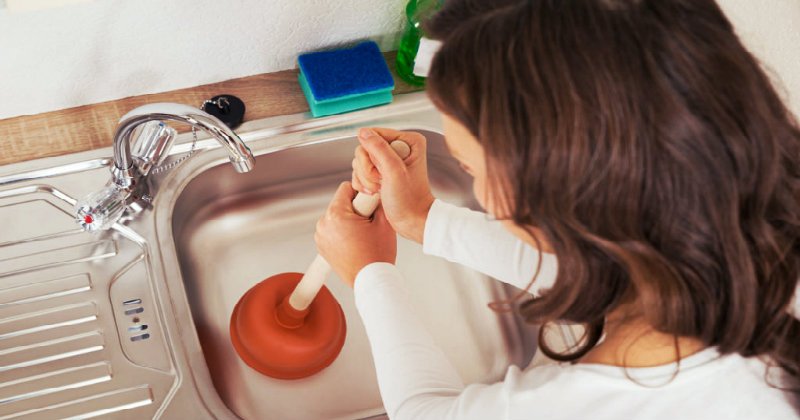
Is Drain Cleaner Truly Bad for Your Pipes?
Has it happened again? Are your drains clogged?
Is the kitchen sink overflowing with what you hope is water? Maybe the bathroom sink is making a gurgling sound that you’ve only ever heard in horror movies. Even the shower drain isn’t immune to a blockage or two from hair and skin swirling down it.
Your mind might flash to TV ads for drain cleaner where they show animations of how simple and easy it is to unclog the pipes. All you seem to need is a bit of drain cleaner, a splash of water, and they’re as good as new.
But the reality is that these toxic chemicals can end up causing more damage to your piping than the obstruction itself. If you’re not careful handling them, they can even result in you injuring yourself when it comes into contact with water.
So is using drain cleaner worth the risk? What are you supposed to do about the clogged drain? Here are the answers to all your questions on whether you should be using any sort of chemicals on your pipes.
How Does Drain Cleaner Work?
If you’ve got a chemistry background, you might already be aware of what happens when Sodium Hydroxide, bleach, Potassium hydroxide, and Sodium nitrate combine with water. If you don’t have a science background, all you need to know is that it causes a reaction when all of these elements meet.
Drain Cleaner aims to break down any obstacles that come into contact with it. Some of the most common types of blockages include food, grease, soap, and hair. The chemicals in the drain cleaner will either break up the obstacle or dissolve it completely.
What Damage Can Drainer Cleaner do to Your Pipes?
Due to the ingredients in drain cleaners, it is capable of causing some significant damage to your pipes, especially if there are existing problems already.
If your piping has cracks or rust surrounding it, then introducing toxic chemicals will continue to weaken it to the point that it will break. This will lead to potential flooding inside and outside your house.
There’s also a risk of the chemicals reacting with other liquids stuck in your pipes. For example, dishwashing liquid or cleaning products won’t respond well with drain cleaner. So if your kitchen sink is clogged, then you’re going to want to take another course of action to clear it.
What Should You Use to Unclog Your Drain?
Just because you shouldn’t use drain cleaner, doesn’t mean you should start learning how to live with clogged pipes. You just need to utilise other tools that are at your disposal to get rid of the obstruction causing you grief.
Boiling Water
Sometimes all you need to clear an obstruction is some boiling hot water. It can help loosen up grease build-ups and dissolve any dirt that’s blocking the pipes. No need for any additional chemicals, just put the kettle on and pour.
Plunger
It’s one of the most reliable tools in a plumber’s toolbox. Most of the time, a good plunge can clear the blockages in a kitchen sink or shower drain. It even works when the toilet’s blocked.
Plumber’s Snake
The plumber’s snake takes a little extra effort to clear drains, but it can get the job done. You’ll want to feed it directly into the drain until it meets some resistance. Then rotate the handle until the blockage is completely removed. The snake should recoil automatically and get stored away until next time.
Baking Soda and Vinegar
Ideal for paper mache volcanos and clearing drains, baking soda and vinegar make a perfect combination. To clear the clogged pipes, start by pouring some boiling hot water and then half a cup of baking soda. After a few minutes, follow up with one cup of vinegar and another cup of boiling hot water. Cover it for approximately ten minutes and then flush it with hot water.
How to Stop Your Drain from Getting Clogged?
Unclogging drains shouldn’t become a regular chore. There are methods and tricks that you can employ to stop them from getting clogged in the first place. Not only will following these tips save you time unclogging them, but it will save you money on purchasing drain cleaner or other tools to keep the pipes clear.
- Ideally, you should only be sending water down the drains, especially in the bathrooms and the kitchen.
- Don’t ever pour oil down the sink. Instead, put it in a bag and then in the bin.
- Invest in a drain guard so that no foreign objects or materials can accidentally clog the pipes.
- Never flush anything down the toilet except for waste, water, and toilet paper.
- Get a plumber to perform regular maintenance on your drains. Have them check for cracks, corrosion, or damage that may end up causing some expensive problems if they’re not fixed.
Who Can Help You Unclog Your Drain?
While the commercials make drain cleaner look like a miracle cure for any clogged drain, it can come at a significant cost. The chemicals used in the liquid to break up obstacles may end up unclogging your pipes, but they also leave your drainage damaged by weakening them.
But just because you have a clogged drain, doesn’t mean you need to put up with it. You can get rid of it using simple objects like boiling water as well as a good old-fashioned plunger. However, the best cure is prevention, such as not pouring oil down the sink or flushing anything other than the obvious.
Unclogging a drain shouldn’t be a regular occurrence for you. If your pipes are continually overflowing with water, then you should get All Day Plumbing in. We’re experts when it comes to drains as well as bathroom and kitchen renovations. Don’t waste your weekends unclogging drains, book an appointment today and let us clear the pipes once and for all.